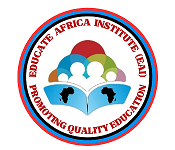The Act of Weeding in Schools Should Not Be Misconstrued Merely as Punishment – William Boadi, EAI

With the highest regard, I would like to respectfully respond to the Chief of Staff’s recent statement on the need to end the practice of weeding as punishment in schools, on the grounds that it discourages students from engaging in agriculture.
While I appreciate the concern behind this call, it is important to carefully reflect on the deeper implications of both the practice of weeding in schools and the broader vision of reviving agriculture in Ghana.
First and foremost, the act of weeding in schools should not be misconstrued merely as punishment. Rather, it carries an educational dimension that introduces learners to basic agricultural practices. In many Ghanaian communities, students are disconnected from farming activities due to urbanization and changing lifestyles. School environments that engage learners in weeding, planting, and tending to gardens often serve as their only point of contact with agriculture. To see weeding only through the lens of “punishment” strips it of its potential to be reframed as training.
That said, the problem does not lie in the act of weeding itself, but in the way it is presented and enforced. If students are told they are being punished through weeding, then naturally, they will associate the activity with disgrace, pain, or rejection. However, if weeding and gardening are integrated into the school curriculum as structured activities under Agriculture, Science, or Environmental Studies, the same act will be embraced as learning rather than humiliation.
The real path to cultivating student interest in agriculture lies not in banning weeding, but in reintroducing Agriculture as a standalone subject across all levels of our educational system. Agriculture should not merely be an afterthought within Integrated Science. It must be restored with dignity, taught with modern methods, and supported with practical tools tractors, irrigation systems, seed varieties, greenhouses, and digital technologies. This will enable students to see agriculture not as a punishment, but as a profession of science, technology, and innovation.
Even today, we see the evidence of Ghana’s failure to modernize. China, which only recently ventured into cocoa farming, already has machines that harvest cocoa and process it on the same day. Meanwhile, Ghana where Tetteh Quarshie first introduced cocoa still depends on the old, expensive, and time-consuming manual methods. At the end of the chain, our hardworking farmers are forced to sell their produce to the government for peanuts. This is not only discouraging, but it also reflects a system that undermines the dignity and sweat of our farmers.
As a nation, we must rise above speeches, with all due respect. The way forward is not simply in declaring what should be stopped, but in creating structures that ensure our students and farmers see agriculture as a career worth investing their passion, creativity, and energy in.
Hon. Julius Debrah, Father, perhaps you may not be fully aware that farmers are now selling their farmlands to illegal miners. Many chiefs are also selling lands to them, with some politicians allegedly involved. This trend is eroding our farming ventures, making agriculture increasingly unattractive. Some farmers are cutting down their Cocoa trees for gold. It is against this backdrop that the Educate Africa Institute (EAI) stands ready to support the fight through strategic public education.
Therefore, I humbly propose that instead of ending weeding outright, the Ministry of Education, the Ministry of Food and Agriculture, and all relevant stakeholders should consider the following:
1. Reintroduce Agriculture studies as a separate subject with practical sessions in every school.
2. Transform school gardens into demonstration farms, where learners practice modern techniques.
3. Equip schools with basic farming tools and technology so that students can see agriculture beyond the cutlass and hoe.
4. Celebrate Ghanaian farmers as national heroes with poverty alleviation incentives, including curriculum content and public recognition.
5. Invest in mechanization and value addition, so that Ghanaian farmers can compete globally and benefit fairly from their toil.
Candidly speaking, weeding in schools should not be dismissed as mere punishment but rather repositioned as a life skill and an entry point to agricultural knowledge. Let us not throw away this practice but instead refine it to serve its highest purpose building the next generation of proud and skilled Ghanaian farmers, equipped with modern tools and global competitiveness.
With utmost respect, I trust that this perspective will be received not as opposition, but as a contribution to the important dialogue you have opened.
Respectfully,
William Boadi
Executive Director, Educate Africa Institute (EAI)
Educationist | Political Analyst | Social Worker
📞 +233541935106
EAI: Education and Social Justice.



